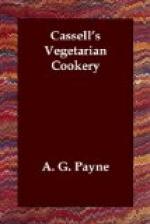Soups owe their thickness to two processes. We can thicken the soup by adding flour of various kinds, such as ordinary flour, corn-flour, &c., and soup can also be thickened by having some of the ingredients of which it is composed rubbed through a sieve. This class of soups may be called Purees. For instance, Palestine soup is really a puree of Jerusalem artichokes; ordinary pea soup is a puree of split peas. In making our ordinary vegetarian soups of all kinds, as a rule, all the ingredients should be rubbed through a sieve. The economy of this is obvious on the face of it. In the case of thickening soup by means of some kinds of flour, for richness and flavour there is nothing to equal ordinary flour that has been cooked. This is what Frenchmen call roux.
As white and brown roux are the very backbone of vegetarian cookery a few words of explanation may not be out of place. On referring to the recipe for making white and brown roux, it will be seen that it is simply flour cooked by means of frying it in butter, In white roux each grain of flour is cooked till it is done. In brown roux each grain of flour is cooked till it is done brown. We cannot exaggerate the importance of getting cooks to see the enormous difference between thickening soups or gravy with white or brown roux and simply thickening them with plain butter and flour. The taste of the soup in the two cases is altogether different. The difference is this. Suppose you have just been making some pastry—some good, rich, puff paste—you have got two pies, and, as you probably know, this pastry is simply butter and flour. Place one pie in the oven and bake it till it is a nice rich brown. Now taste the pie-crust. It is probably delicious. Now taste the piece of the pie that has not been baked at all. It is nauseous. The difference is—one is butter and flour that has been cooked, the other is butter and flour that has not been cooked.
* * * * *
One word of warning in conclusion. Cooks should always remember the good old saying—that it is quite possible to have too much of a good thing. They should be particularly warned to bear this in mind in adding herbs, such as ordinary mixed flavouring herbs, or, as they are sometimes called, savoury herbs, and thyme. This is also very important if wine is added to soup, though, as a rule, vegetarians rarely use wine in cooking; but the same principle applies to the substitute for wine—viz., lemon juice. It is equally important to bear this in mind in using white and brown roux. If we make the soup too thick we spoil it, and it is necessary to add water to bring it to its proper consistency, which, of course, diminishes the flavour. The proper consistency of any soup thickened with roux should be that of ordinary cream. Beyond this point the cooked flour will overpower almost every other flavour, and the great beauty of vegetarian cookery is its simplicity, it appeals to a taste that is refined and natural, and not to one that has been depraved.




